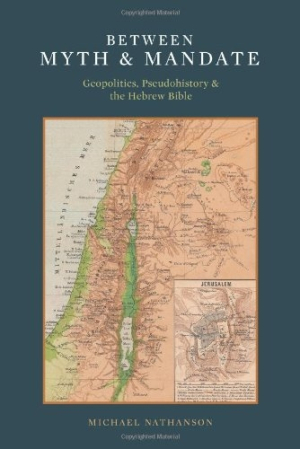Between Myth and Mandate
Geopolitics, Pseudohistory, and the Hebrew Bible
Nathanson challenges the Jews’ historic claim to exclusive sovereignty in the “Promised Land” between the Jordan and the Mediterranean.
Michael Nathanson, author of Between Myth and Mandate: Geopolitics, Pseudohistory, and the Hebrew Bible, has insinuated himself into one of the most difficult issues of our time and, perhaps, all time: the right of the Jews to exclusive sovereignty in the “Promised Land,” which currently encompasses Israel and the occupied territories. Whether he is entirely correct or not, any person reading Nathanson’s seven-hundred-plus-page treatise will likely conclude that he has masterfully done his research and forcefully presented his thesis.
Nathanson is an amateur historian and Bible scholar who formerly worked as a thoracic surgeon. He was born and received his medical education in Israel. Between Myth and Mandate, by his own declaration, is the product of a lifelong interest in the Bible that includes collaborative consultations with academic experts in the field.
In the beginning of the book, Nathanson writes, “I view the Bible’s master narrative as a historic document rather than a historical treatise.” In other words, to the author, the Bible is a book with great and lasting importance, but it is not necessarily based on history. Throughout this volume, Nathanson is clearly more interested in why the various books of the Bible were written than in who wrote them.
The book is well organized and begins with two essays, one on the meaning and practice of history and the second on the more specific archeology and history of the ancient Middle East. The chapters that follow are each devoted to a specific time period in the story of the Jews. While much of this material may be somewhat familiar to the average reader, Nathanson’s research often takes him much deeper into this history; his discussions of information and sources better known to academicians may be difficult for many to follow. Unless a reader is prepared to follow Nathanson’s footnoted references and do his or her own research, Nathanson’s conclusions and observations must be taken at face value.
Likewise, the language used may challenge some. Having a dictionary handy will aid in comprehending the presentation as it unfolds. This is not a book for the uninitiated. For instance, comprehending Nathanson’s remarks on the historicity of the Davidic-Solomonic kingdom using the Bayes’ theorem is daunting. Essentially, Bayes’ theorem is a statistical device, expressed as an actual equation, used to predict the probability of the existence of an event or condition.
This is not to say that the book gets bogged down in scholarship. The author always maintains a connection to his purpose, which is practical and easily understood. In essence, Nathanson is challenging the Jews’ historic claim to Israel as the “Promised Land.” He concludes: “In the twenty first century, the Bible’s apocalyptic and pseudohistoric text, forged in the geopolitical crucible of late Greco-Roman Judaea, cannot be legitimately invoked to perpetuate the geopolitical injustice caused by Israel’s disruptive policies.” Nathanson believes that the indigenous non-Jewish population has a historical right to their own state. Nathanson likely did not write this book, however, to debate current politics and policies; he is a scholar, and this is more of a scholarly contribution than a polemic.
Nathanson wrote Myth and Mandate to correct what he believes is the misuse of biblical narratives in the political debate in Israel. Myth and Mandate is a long, detailed book that can be a fascinating and rewarding read if approached with an open mind about matters that are often taken as sacred truths.
Reviewed by
John Senger
Disclosure: This article is not an endorsement, but a review. The publisher of this book provided free copies of the book and paid a small fee to have their book reviewed by a professional reviewer. Foreword Reviews and Clarion Reviews make no guarantee that the publisher will receive a positive review. Foreword Magazine, Inc. is disclosing this in accordance with the Federal Trade Commission’s 16 CFR, Part 255.

